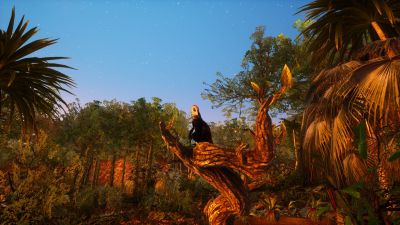Utahraptor

Contents
Paleo Stats
Species: U. ostrommayosorumTime Period: Cretaceous
Length: 5.7 meters (19 feet)
Weight: 500 kilograms (1100 pounds)
Basic Information
Category: CarnivoreDiet: Meat
In-game Stats (Adult, Growth 1.0)
Health: 300Stamina: 120
Ability: 150
Base Food Capacity: 100
Overweight Food Capacity: 130
Water Capacity: 100
Oxygen Capacity: Average
Growth Rate: Fast
Weather Resistance: Very Low
Can be picked up by a tornado: Yes
NOTE: THE UTAHRAPTOR IS CURRENTLY DISABLED
Overview
The Utahraptor is a playable creature in Beasts of Bermuda. It is a very large member of Dromaeosauridae: the family of raptors. This nimble predator is able to effortlessly leap over rough terrain, easily chase down prey such as the Parasaurolophus, and tear it dead with swift and agile strikes.
Since the Utahraptor is a very active predator, it sports a better amount of ability power and stamina compared to most other creatures, further benefiting its speed by letting it run for lengthy durations. However, it has a small health pool and low weight, but they can can easily make up for this flaw by forming together as one. Utahraptors prove to be an absolute force to be reckoned with as a pack, and a flock of Utahraptors, with some coordination and planning, can completely shred apart even the most intimidating creatures.
_________________________________________________________
Pros and Cons
Pros:
+ Very mobile
+ Deadly in a pack
+ Great damage relative its size
Cons:
- Low health
- Bad weather resistance
_________________________________________________________
Abilities
- Primary Attack: A close ranged bite. It deals only a moderate amount of health damage, but it can be used in rapid succession, making it a dangerous attack when executed repeatedly. It also only drains the Utahraptor's ability power by a very small amount, allowing it to perform this attack multiple times for a lengthy duration before its ability power runs out.
- Secondary Attack: An instantaneous pounce attack. It provides the Utahraptor with spectacular combat mobility, allowing it to leap into the fray or away from danger in a moment's notice. Furthermore, the Utahraptor can pounce while moving, though it consumes a hefty amount of stamina, so use it sparingly!
Special Secondary Attack Details: If the ability key is tapped while pouncing, it performs a Latching Pounce attack. The Utahraptor is capable of latching its claws onto Apatosaurus and beached Mosasaurs. As the Utahraptor is latched on, it inflicts constant health damage to its target. The Utahraptor can stop latching by pressing Right Click at anytime. Latching slowly depletes the Utahraptor's ability power, so if the Utahraptor stays latched on for the entire duration, it will eventually deplete all its ability power and fall to the ground. (This differs from the pounce of the Velociraptor, who is able to latch onto a much wider array of creatures but isn't as mobile)
Unique Attribute: The Utahraptor possesses a significantly enlarged amount of ability power; having been granted 150 rather than the typical 100, and a moderately enlarged amount of stamina; 120 instead of the standard 100.
_________________________________________________________
Weakness
Finding a pack is difficult and is not always available, and playing solo exposes a Utahraptor to a wider number of threats.
Aquatic predators prove to be problematic. They're the only predators a Utahraptor pack can't deal with. The Mosasaurus and Elasmosaurus are capable of drowning Utahraptors by dragging it down into the water, and the Kronosaurus can mutilate pretty much any medium-sized creature with its charge attack. Caution is advised not only in the water, but near the water.
Lastly, the Utahraptor cannot stand the extreme harshness of storms and other disastrous weather events. It must hide under shelter or die from stress.
_________________________________________________________
Additional Notes
- The Utahraptor will have Crest/No Crest variants in the future.